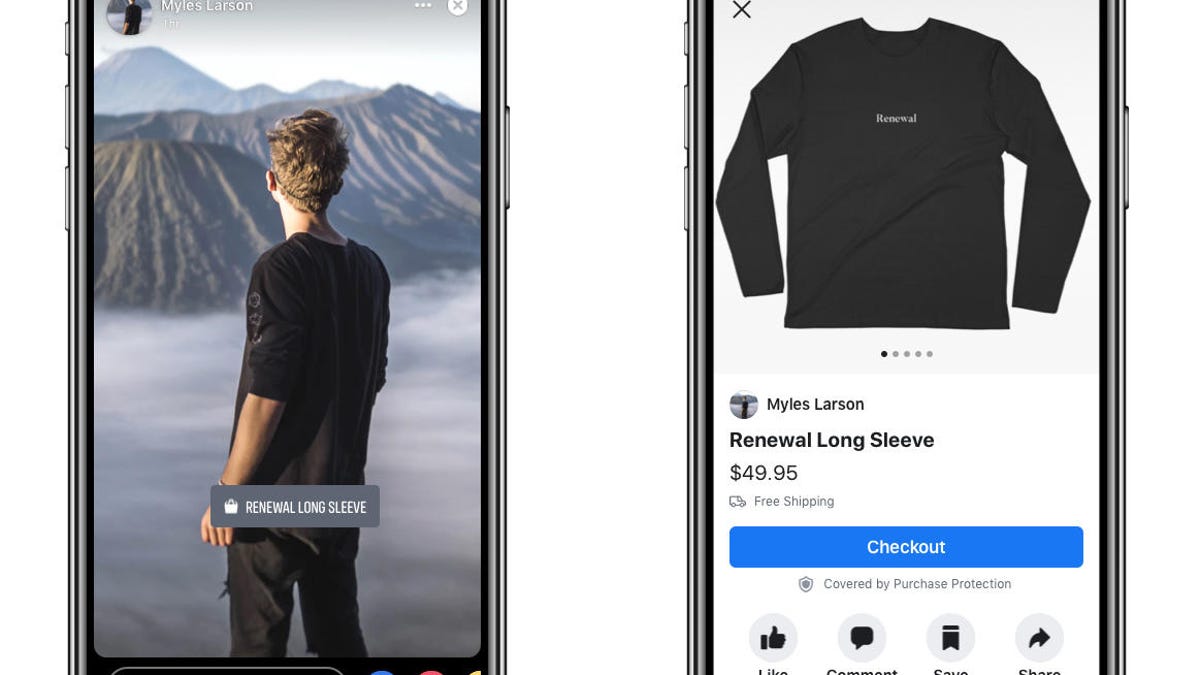Facebook adds ways for public figures to make money from selling merch
Facebook is also adding new kinds of stickers and collaborative stories for people like musicians, actors, athletes, authors and other creators.

Facebook is introducing more ways for creators to make money off the platform, like selling merch.
Facebook on Tuesday announced new tools for making money off the social network, like direct merchandise sales, for pubic figures including musicians and bands, actors, athletes and authors. The company also said it's testing features designed to help public figures widen their audiences, adding tools like fancy stickers to engage with fans and sharing new ways for public figures to be protected from abuse.
With more than 2 billion daily active users, Facebook is the world's biggest social network.
Most significantly, Facebook is expanding shopping options for fans to buy products directly from public figures. It's adding "swipe up" links to Facebook Stories, which allows a link out to products or other recommendations they want to share with their followers. Public figures can also tag products in Facebook photo and video posts, something that's expanding to Facebook Stories too. It simplified checkout for shoppable posts, so fans can tap on a tagged product to learn more about it and buy directly on Facebook.
It's expanding its Facebook Stars, which essentially let fans tip creators a penny per star during live streams. The Stars program began just for gaming streams, but is being widened to other video creators.
Facebook is also addressing ways to better clarify when an account is the one actually belonging to a public figure versus a stan account worshiping (or trolling) a star. The company said it introduced a new procedure for reporting Facebook Pages, Profiles and Instagram Accounts pretending to be public figures, and it said "using proactive technology" to root out accounts might be misleading and temporarily restricting them.
Facebook is testing "collaborative stories" for public figures, which would let multiple creators contribute to the same story so fans can get different perspectives around a specific topic or event. It tested the feature with dance music festival Tomorrowland, letting more than 20 artists with more than 73 million combined followers contribute to a Tomorrowland Story.
It's also testing a feature in its all-powerful News Feed that surfaces public figures who might be of interest because of the people you already follow or content you've engaged with on Facebook.
It's adding a Fan Reply Sticker for Facebook Stories, which lets people using Pages create prompts for followers to respond to with a photo or video. Responses can be reshared to their story for all their fans to see. For example, AC/DC used the Fan Reply Sticker around the 40th anniversary of its Highway to Hell album by asking fans to show off their "Duckwalk" mimicking guitarist Angus Young's on-stage moves. The NBA also tested it to ask fans to share photos of who they were supporting in upcoming games.
Finally, the company announced some moves to help protect public figures from abuse. They included expanding harassment policies, updating comment rankings on public posts to improve relevance and quality and launching a Help Center for knowing how to spot and report suspicious accounts or interactions. It's testing an on-platform campaign directing people to this information if they previously interacted with an inauthentic account.

